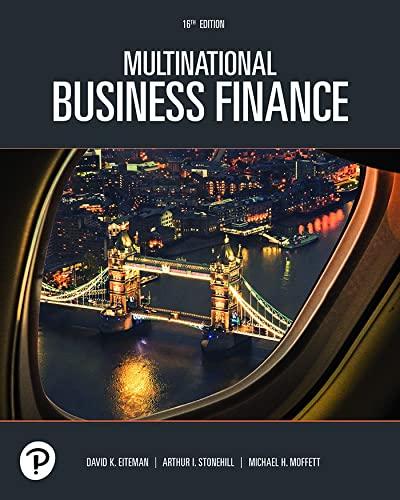Question
Assume a firm which is only active for one period. All investors are risk-neutral, the discount rate is zero, and there are no taxes. As
Assume a firm which is only active for one period. All investors are risk-neutral, the discount rate is zero, and there are no taxes. As it stands, with no new project implemented, next period cash flows will be either 160 or 80 with equal probability. The firm has debt outstanding with a face value of 120, which is due next period. Managers make all investment decisions in the interest of equityholders.
a. What is the value of the firm? What is the value of the firms equity? What is the value of the firms debt?
Now assume that the firm has a new investment project. It requires additional financing of 30 and the firm has no excess cash available. If the firm invests in this project, the cash flows next period will increase by 40 for sure. In other words, if the firm invests in the project, total cash flows will be either 200 or 120 with equal probability.
b. Assume that there are covenants prohibiting the issue of any additional debt. What would be the new value of debt and equity if shareholders decided to fund the project via an equity injection? Will shareholders be convinced by the manager to put in the 50 for the investment?
Now assume that the firm has a new investment project. It requires additional financing of 30 and the firm has no excess cash available. If the firm invests in this project, the cash flows next period will increase by 40 for sure. In other words, if the firm invests in the project, total cash flows will be either 200 or 120 with equal probability.
c. The manager asks the debtholders to waive the covenant so that the company could issue debt pari passu, i.e. new senior debt will share the cash flows with the existing debt in case of default in proportion to each debt components face value. What would the value of old debt, new debt, and equity be if such a debt financing of the new project occurred? Will the existing debtholders agree to waive the covenant in this specific way? Will there be investors willing to raise new pari passu debt of 30 to finance this project?
Now assume that the firm has a new investment project. It requires additional financing of 30 and the firm has no excess cash available. If the firm invests in this project, the cash flows next period will increase by 40 for sure. In other words, if the firm invests in the project, total cash flows will be either 200 or 120 with equal probability.
d. The manager instead asks the debtholders to waive the covenant so that the company could issue senior debt, which would be paid off before the existing debt in case of default. What would the value of old debt, new debt, and equity be if such a debt financing of the new project occurred? Will the existing debtholders agree to waive the covenant in this specific way? Will there be investors willing to provide new senior debt of $30 to finance this project?
Now assume that the firm has a new investment project. It requires additional financing of 30 and the firm has no excess cash available. If the firm invests in this project, the cash flows next period will increase by 40 for sure. In other words, if the firm invests in the project, total cash flows will be either 200 or 120 with equal probability.
e. Assume now that, out of fairness to long-term creditors, the law forbids companies from issuing new debt senior to existing debt. Can the company finance its project? How is such a situation called in financial theory?
Step by Step Solution
There are 3 Steps involved in it
Step: 1

Get Instant Access to Expert-Tailored Solutions
See step-by-step solutions with expert insights and AI powered tools for academic success
Step: 2

Step: 3

Ace Your Homework with AI
Get the answers you need in no time with our AI-driven, step-by-step assistance
Get Started


